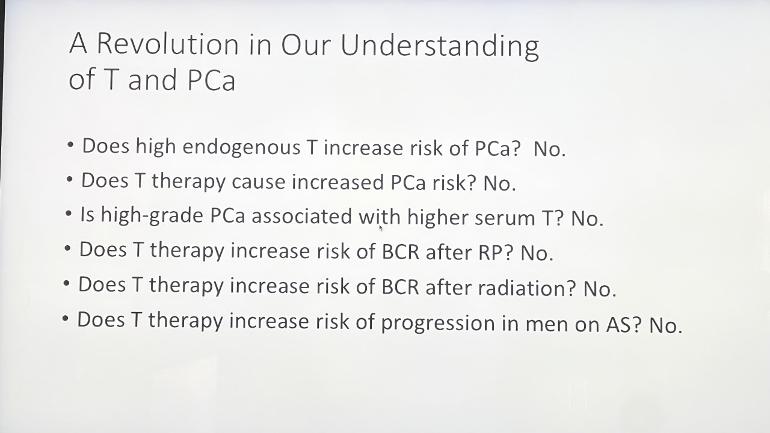...ditto from Dr Morgentaler. Its astonishing that we have been treated with a regime that is based on the published results of one man, 60 years after the fact. Its said that it takes 50 years to get a bad idea out of medicine and 100 to get a good one introduced...I think they were off on the latter by a factor of 2...I digested Dr Morgentaler's 2d podcast and it corroborates his Feb23 treatment of this issue...to say I feel foolish for being on ADT for 21 months and suffering its effects of is understatement...it appears that what is really needed is not to take T to zero but stay around 200-250...below that you are just causing colateral damage...if the cancer will progress it will do so at a T of 0 or a T of 250...makes little statistical difference from what I can see...this appears to be the basis of BAT treatment as was noted here...TNX
ART Testosterone Therapy (TTh) in Men w Advanced PCa
Min 0:58; high testosterone causes prostate cancer, is not protective and raising T (testosterone) in a man with prostate cancer propagates disease. SOC for 60 years.
Min 4:05; testosterone is a brain hormone. It activates sexual function in the brain.
Min 7:02; study 77 men with low testosterone, had similar incidence of prostate cancer as men with positive DRE or high PSA. Low Testosterone was not protective.
Min 9:10; during the PSA era 1985 to 2004 there were no published articles on the relationship between testosterone and prostate cancer. None, zero, niet, nada, nein...
Min 10:02; Dr Huggins, 1941 landmark article states cancer of the prostate is activated by testosterone injections.
Min 12:02; basis of 1941 paper rests on one male, non-castrated patient. The total number of men evaluate in the study was three and only one had reported results. This is the basis of 60 years of treatment.
Min 13:38; saturation model is proposed. Rising testosterone does not correlate with more aggressive or increase prostate cancer.
Min 15:25; PSA concentrations are Androgen dependent. The saturation point is approximately 250 ng/dL. Testosterone above this level is not metabolized by prostate cancer cells.
Min 16:55; high-grade cancer is correlated with low testosterone levels.
Min 18:15; testosterone therapy after radical prostatectomy in 103 men. Progression was four times higher in men without testosterone therapy.
Min 22:30; 38,000 men in study, 5-year cumulative incidence for prostate cancer. Men treated with testosterone had lower incidence of prostate cancer 2.8% vs 3.8%.
Min 24:40; a revolution in our understanding of testosterone and prostate cancer. Some contemporary conclusions are noted.
Min 31:26; BAT bipolar androgen therapy. Study 16 men. Cycles of 4 week injections with high-dose T followed by ADT shows PSA decline in 50% and half had reduced nodal mass.
